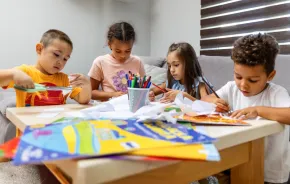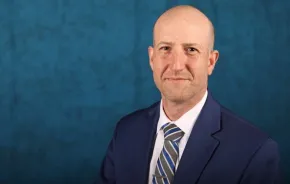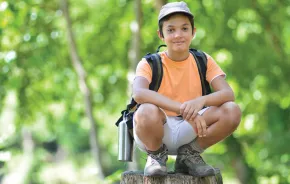
Although Ben Wahl, MSW, is a cofounder of QRKCON, a unique gaming and media convention for the neurodiverse community, he is quick to deflect ownership of the initial concept. (The inaugural QRKCON is set to take place on the weekend of May 4–5 at Washington Hall, near Seattle University.)
“The idea came from some awesome teens and young adults that I work with at Ryther. All of the best ideas come from the community. My job is just to listen,” says Wahl, who founded Ryther’s Aspiring Youth program, which serves children, teens and young adults with autism, ADHD, learning disabilities and similar traits. The core of his work has been focused on providing social skills groups, summer camps and young adult transition services. But he has long believed that teaching skills is only the first step; these young people also need engaging activities through which they can practice those skills and build confidence by connecting with their tribe. When his clients shared their desire for a community-wide event, he was more than ready to listen. Presented by Ryther, QRKCON will feature video game and tabletop game exhibits, a Magic the Gathering draw tournament, panels, an art expo, food trucks and more.
“The entire QRKCON event will be a sensory- and family-friendly experience designed to meet the needs of those from autism, ADHD and other disability communities,” says Wahl, who is creating this first QRKCON convention with the help of cofounder Ajay Pellegrini and other colleagues. “The big conventions can be overwhelming for my clients. They’re not walking out of them with friendships. We know that video, RPG [role-playing games] and tabletop gaming can be a positive way for kids to connect to each other and to their families.”
In anticipation of QRKCON, we talked with Wahl about how he thinks true community inclusion works. At ParentMap, we’ve also been pondering how work and home life complement each other, so we also asked Wahl about how his professional and parenting spheres overlap.
How can parents build a more inclusive parenting community?
As inclusive as Seattle is, we still have some big blind spots. These blind spots can look like disparaging glances at the playground and an assumption a kid’s behavior is tied to parenting. A lot of the families I work with tell me that the birthday party invitations stop coming after third or fourth grade. It’s usually not the case that the parents are actively trying to exclude. They might say things like, “Well, I let my daughter make the birthday party list.” But there’s a lot of missed opportunities when we’re homogenizing our social situations to avoid “different” behavior or social styles. I’ve had the most incredible, insightful conversations with 10-year-olds with autism, and I am sad that some people will miss out on that experience.
How has your work affected your role as a parent?
I’ve learned parents deserve to be easier on themselves and each other. Parenting strategies are a starting point, but we often take them as a manual to follow. Then, if our kids are not doing well, we think we are not doing it right. Through work, I’ve seen incredible parents persist and adjust as their kids grow and change. I’ve been struck by the joy they bring to parenting — that it’s not all about hard work. I try to remember to move forward with joy as I work to impart values and create a healthy future for my child. I also always try to remember that it’s not the job of parents of kids with disability to teach me life and parenting lessons. The parents I work with don’t want to be treated differently than other parents or be cast into a role of martyr; they just want to help their kids have a good life and enjoy those wonderful moments of parenting that make the hard moments worth it.
How has becoming a parent affected your work?
Now I know how important the parent community is for parents. Before I was a parent, I also didn’t fully understand the degree to which the parents I worked with felt isolated from the broader parent community. I’m more aware of my blind spots. When I hear a parent do the humble brag of “My Johnny only got a B+ on the test,” I cringe a little. I know that comment can be hurtful to a parent with a kid with autism who struggles in school.
What do you want your daughter to learn about your work?
My daughter sees that I am proud to work with people with disability, and that’s very important to me. Talk to just about any parent at an inclusion-focused preschool and they will literally glow about their kid’s experience. Once you get to spend time with people from the disability community, you just can’t imagine confining yourself to a neuro-typical social milieu.
Inclusion is just the start. From there, we can either have assimilation or integration. Assimilation requires the person to conform to social norms, blend in and leave their quirks at the door — meaning the person is simply tolerated by their mainstream peers. Integration means that the community seeks to learn from the person and constantly looks for ways to have the inclusion of that person help improve the overall community. I want my daughter to have not only empathy but excitement about interacting with people who are different from her.











